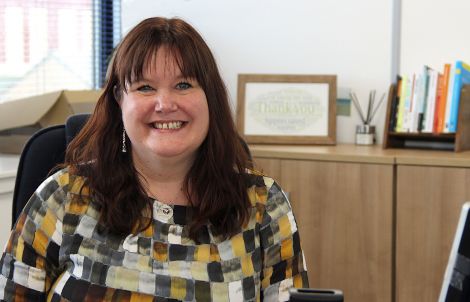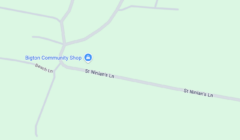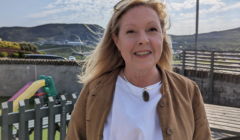Community / What opportunities could AI bring to public services in Shetland?
“I DON’T think we should be frightened of the opportunity that comes with technology.”
That is the view of Shetland Islands Council chief executive Maggie Sandison when asked about the significant rise of artificial intelligence (AI) in recent years and how it could potentially support the local authority.
With continued recruitment challenges, she believes advancements in technology such as AI could offer opportunities to allow the existing workforce to concentrate on jobs only humans can do.
Meanwhile following a recent visit to Shetland, Scottish health secretary Neil Gray said he believes technological innovation is going to be “absolutely critical” for the sustainability and productivity of the health service – especially for NHS boards where there may be constraints on the workforce, such as in the islands.
“I believe it’s going to form a key part of where I think the reform agenda for health and social care needs to go,” he said.
The subject has been a hot topic particularly in the last year or two, with generative platforms such as ChatGPT – where people can have human-like conversations with AI and receive assistance in tasks like email and essay writing – one way of showing how computers are increasingly able to perform automated tasks with impressive results.
It is credited with helping to start the so-called ‘AI boom’ which has also included computers being capable of generating art like images and music.
But at the same time there is some concern around the possible threat of AI, including on human jobs and also the potential for it to be manipulated for malicious purposes.
Become a member of Shetland News
Sandison said the rise in AI comes at a time when Shetland’s council as a whole is experiencing increased difficulty in filling posts, against an ageing workforce.
On the latter, she said the number of people who may leave the SIC in five to ten years is “quite concerning”.
“I think it is absolutely necessary for us to be looking at how do we use the people that we have available to us better,” Sandison said.
“Where there are technological solutions that will work, we should be using those technological solutions so we can keep the availability of workforce for the jobs that only people can do.”
She added that in addition to grasscutting the council has been looking at automation in some other areas such as cleaning.
There has also been technology used in health and social care around helping people to be cared for at home.
Sandison also noted how there are pilots taking place across the country in other areas, such as in transport and road repairs.
“As technology developers after it gets appropriately tested, as it becomes mainstreamed it would be appropriate for us to be looking at how it applies in Shetland too,” she said.
“I think that is probably as important to us as looking at how we can change services, how we can redesign them to make the most of the people that we have.”
She said there has been a management training session on how platforms like ChatGPT can support an organisation, and suggested that the public sector may have to catch up with the private sector.
But the SIC chief acknowledged that it is hard to know where things will go with technology in the future.
“It really provides opportunities to do better things than we might have done in the past,” Sandison said.
“I think we shouldn’t be frightened of the opportunity that comes with technology.
“We have to pilot it to make sure that it works, but in doing that what it allows us to do is do our service delivery differently and make the most of the workforce.”
When it comes to health and care, the opportunities of AI was brought up in a meeting of Shetland’s integration joint board last year.
Jo Robinson, who was then interim chief officer but now holds the role permanently, said there was no suggestion AI would remove the quality of or the need for human interaction in care situations.
But she said there was potential for AI to assist with lower level or repetitive jobs – some things computer can do more accurately than humans – and also help with workforce challenges.
Artificial intelligence is already being used at a national level in health care, with NHS Grampian’s radiology department for instance trialling AI to help consultants screen for cancer.
In this case AI helps to flag up abnormalities, speeding up the process for staff.
There is also government funding available for the development of the AI industry.
Speaking to Shetland News, Scottish health secretary Neil Gray said he believed technology will play an important role in the future, especially in freeing up time – but it needs buy-in from patients and staff.
“Obviously it needs to be done in an ethical way, making sure that the ethical elements of artificial intelligence in this case, but other technical advances, are considered and thought through,” the MSP said.
“But I very much see the opportunity that technological advancement and innovation can make in freeing up clinical time to ensure that we maintain our enhanced capacity for people to be able to access healthcare, and that particularly being the case in remote and island communities where it is obviously more challenging to be able to provide these treatments than it is where you’ve got a higher volume of need elsewhere in Scotland.
“I think there’s a big opportunity there, but it obviously has to be done in collaboration with patients and clinicians to make sure that what we’re bringing forward actually works.
“I’ll very much be taking evidence and listening to what patients and clinicians feel is going to be appropriate – what is actually going to be practical and improving the situation going forward, and have that as a key consideration as part of the reform work coming forward.”
Become a member of Shetland News
Shetland News is asking its many readers to consider paying for membership to get additional features and services: -
- Remove non-local ads;
- Bookmark posts to read later;
- Exclusive curated weekly newsletter;
- Hide membership messages;
- Comments open for discussion.
If you appreciate what we do and feel strongly about impartial local journalism, then please become a member of Shetland News by either making a single payment, or setting up a monthly, quarterly or yearly subscription.

















































































